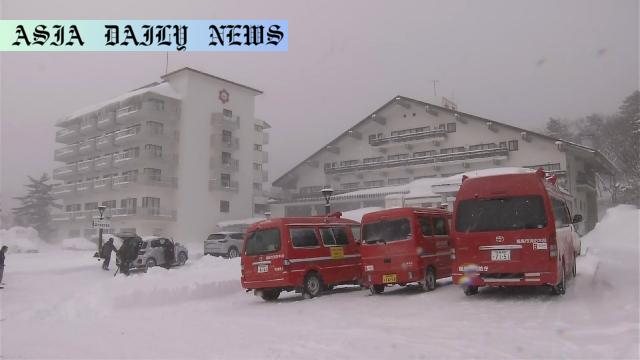Hot Spring Incident: Three men found dead near a hot water source in Fukushima City; hydrogen sulfide suspected as the cause.
- Three men found dead near a hot spring source in Fukushima, Japan.
- High hydrogen sulfide levels in the area suggest poisoning.
- Police continue investigations and identification efforts.

Discovery of Three Collapsed Men in Fukushima
In an unfortunate tragedy, three men were found collapsed on snow-covered terrain near the Takayu hot spring resort in Fukushima City, northeastern Japan. The individuals were identified as staff members of the Kagetsu Highland Hotel, who had been reported missing after going to inspect the source of the hot spring’s water supply. Their bodies were discovered by rescuers before noon the following day.
Potential Cause: Hydrogen Sulfide Levels
The area where the men were found reportedly has high levels of hydrogen sulfide, a toxic gas often emitted from hot spring sources. Hydrogen sulfide poses a serious health risk when inhaled in high concentrations. Authorities are investigating the specifics of the incident, including environmental factors that may have contributed to the tragedy, as well as potential safety standard breaches during the inspection.
Details About the Victims
The three victims included the hotel manager, who was in his 60s, and two employees aged in their 50s and 60s. These individuals were highly regarded members of the hotel staff, responsible for its operations in one of Japan’s renowned hot spring resorts. While their identities are being confirmed, their passing has sent shock waves through the community and the hospitality industry in Fukushima.
Investigations and Safety Implications
The police are working in collaboration with local officials to determine the exact circumstances of the incident. With high hydrogen sulfide levels suspected to have played a role, the tragedy spotlights the inherent dangers surrounding natural hot springs. Hydrogen sulfide, though naturally occurring, is a poisonous gas with fatal effects if encountered without proper precautions. This raises critical questions regarding worker safety practices and preventive measures for those working in hazardous environments.
Community Repercussions and Condolences
Local authorities and residents have expressed their condolences to the families of the victims. The incident has prompted a broader examination of operational safety standards in Japan’s hot spring industry, urging businesses to reassess risk management protocols. The loss of these three lives has urged the region to prioritize stricter guidelines to avoid further preventable accidents.
Global Attention to Hot Spring Safety
While hot springs are a major attraction in Japan and contribute significantly to the tourism industry, tragedies like this bring international attention to the potential hazards tourists and professionals may face when interacting with natural geothermal features. Governments and environmental agencies globally may find this incident a point of reference for ensuring safety in similar environments worldwide.



Commentary
A Sobering Reminder of Workplace Safety
The tragic deaths of three staffers near a hot spring site in Fukushima underscore the hidden dangers that persist even in seemingly idyllic locations. While hot springs are celebrated internationally as places of relaxation and rejuvenation, incidents like this remind us that those working behind the scenes are exposed to hazardous conditions. Employment in such environments necessitates stringent safety protocols, adequate training, and access to protective equipment.
Navigating Risks in the Hot Spring Industry
This unfortunate event highlights a critical oversight in ensuring that proper safety mechanisms are in place for hot spring-related operations. Hydrogen sulfide poisoning, while a known risk, seems not to have been adequately mitigated in this case. The industry, along with local governments, must take immediate steps to address such risks by investing in advanced monitoring systems and implementing detailed emergency procedures to safeguard lives.
An Opportunity for Broader Awareness
While this tragedy is localized to Fukushima, it carries a universal message about awareness of environmental hazards, no matter where they occur. Visitors and workers must be educated about potential dangers faced in geothermal areas and equipped with the necessary tools to react if exposed. By embracing stricter safety norms, the hot spring industry in Japan and beyond can serve as a model for balancing natural beauty and human safety.